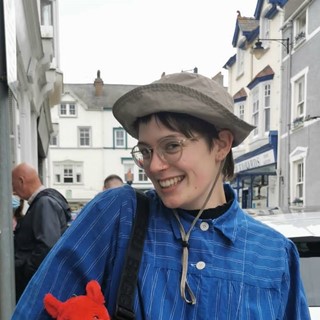Amelia Cripps (they/them)
Trainee Medical Physicist Nuclear Medicine & Diagnostic Radiology at Sheffield Teaching Hospital NHS Foundation Trust

Where on the LGBTQ+ spectrum do you identify?
I’m queer and non-binary. Queer in the sense that as a person outside of the gender binary, other sexuality labels don’t reflect my experience, so I choose to leave that label ambiguous.
What does your work involve?
I’m on the Scientist Training Programme, in my 2rd year out of 3, so I’m learning the deep inner workings of the nuclear medicine and diagnostic radiology departments. Typical work I’ll be doing is auditing the dose that patients are receiving from a certain procedure; assisting with quality checks on our scanners to make sure they’re giving/receiving the right amount of radiation; and helping out with any problems we run into in the department, such as strange image artefacts.
What challenges have you faced being LGBTQ+? Bit of personal history maybe?
It took me 16 months at my job before I felt comfortable/brave enough to come out to my colleagues as non-binary. In my workplace, I hadn’t knowingly met another LGBTQ+ scientist, so there were no guaranteed comrades for me when I decided to come out. The increasingly transphobic environment in the UK was the major source of fear for me; you never know who has been reading that media and has that transphobia rooted in their worldview. Thankfully my team have been supportive, and now it gives me a thrill to read that I’ve been gendered correctly in comments about myself.
This was my first full-time job out of uni and I found it extremely hard to transition (pardon the pun) from being surrounded by a merry band of queers at all times to being in the very straight workplace environment. Hopefully now that I’ve come out and no longer feel that I have to suppress who I am at work, I will gradually start to feel more comfortable.
I’d also like to note that as a white person, my experience had a level of privilege not afforded to QTIPOC (Queer, Trans, Intersex People of Colour) community members.
What changes could be made to achieve a more inclusive work environment?
I’m a massive advocate for removing all the gendered vocabulary from procedures and guidance surrounding pregnancy, breast/chestfeeding, and mammography. It’s pretty out-dated to assume that these areas only concern ‘women’ and ‘mothers’, and it can be dangerous too – if a trans man isn’t asked whether he could be pregnant before receiving a radiation dose, it could have serious consequences.
I also think it’s so important for people to be aware of the specific needs that transgender/non-binary/gender-non-conforming people have in a medical setting. A huge amount of people from these groups actively avoid healthcare out of fear of discrimination, both active and passive, and the lack of knowledge and training on these issues is only perpetuating the problem. Examples of these specific needs might be: have you asked your patient if their recorded name matches their preferred name, and asked them for their pronouns? Have you considered the dysphoria and discomfort that your patient may feel when you discuss their chest, genitals and reproductive organs? Have you been discreet whilst asking them if they could be pregnant, so as not to ‘out’ them to a busy waiting room?
These things may feel like too much to consider, but when these people feel so anxious and disregarded that they avoid healthcare, we should do everything we can to mitigate that, and spread some confidence back into the community that they will be treated with respect and have their identity honoured.
What is IPEM doing well for the LGBTQ+ community and its members?
Things like this! Helping LGBTQ+ members be visible.
What should / could IPEM be doing to increase LGBTQ+ inclusion?
It would be lovely to see all contributors add their pronouns into their email signatures – it makes it a little more friendly for trans people/ to add theirs and not stick out like a sore thumb.
What do you think that the medical physics profession could learn from the LGBTQ+ community and their experiences?
That it’s hard being LGBTQ+! The world wasn’t designed for us, so any small changes you can make in your workplace to make us feel seen and respected would be joyous!
Anything else to add?
Power to all my trans siblings, especially those whose experiences are made more difficult by racism, transmisogyny, ableism and classism.